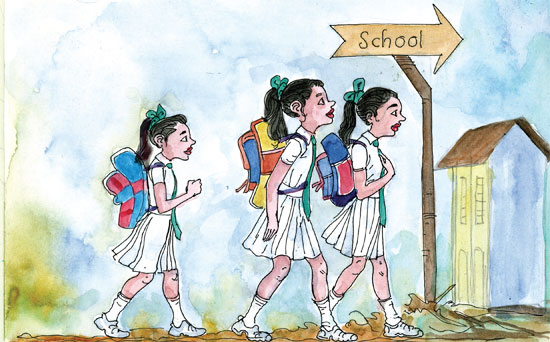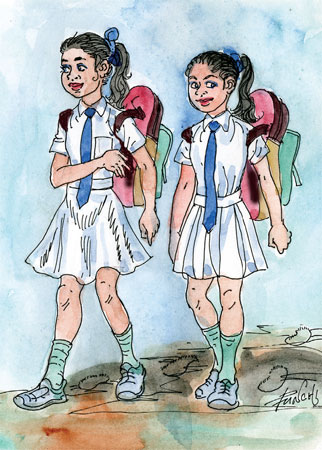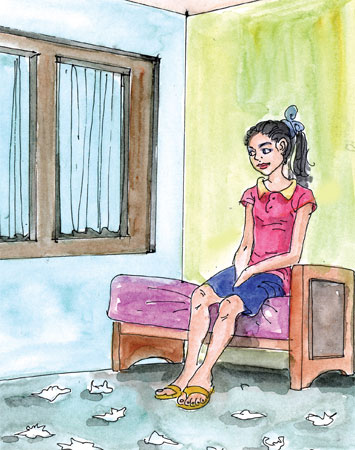|

by R. S. Karunaratne
Common expressions without ‘the’
|

The children are going to school. |
We do not use ‘the’ with meals.
What did you have for breakfast?
Let’s have lunch at the Hilton.
In Asian countries dinner is the last meal for the day.
Let’s meet before breakfast.
Are you after lunch?
We do not use ‘the’ with days, months and public holidays.
Here’s a poem with all the days of the week:
“Solomon Grundy,
Born on a Monday,
Christened on Tuesday,
Married on Wednesday,
Took ill on Thursday,
Worse on Friday,
Died on Saturday,
Buried on Sunday
That was the end of
Solomon Grundy.”
We do not use ‘the’ with ‘next’ and ‘last’ with a period of time.
Uva Provincial Council elections will be held next month.
Where will you be next week?
I met Sam last month in Mutur.
He phoned me last Sunday.
We do not use ‘the’ with certain places and activities.
Rex is a Professor of English at Hillburn University.
The children are going to school.
What time do you return home from college?
Christians go to church on Sunday.
Most criminals are in prison.
If you are ill, go to hospital.
She went to bed early yesterday.
Will you be at home tomorrow?
He was returning from work when the accident occurred.
|

I used to go to school on foot. |
From tomorrow children will not attend school.
We do not use ‘the’ with expressions involving transport.
I go to office by train.
Some people go to work by bus.
A lot of people travel by plane.
You can reach the small island by boat.
I used to go to school on foot.
[Activity]
Fill in the blanks with ‘the’ where necessary. Check your answers
with the key.
1. ........... men fear ........... death.
2. .......... death of .......... Prime Minister left his party without
a leader.
3. .......... Scotts have porridge for .......... breakfast.
4. ........... wedding breakfast was held in her father’s house.
5. Do you play ........... golf?
6. .......... ball hit John’s face.
7. She seized ........... child by ............ collar.
8. He was hit on ............. head.
9. If you interfere with ........... nature, you will suffer for it.
10. Tomorrow I’ll be at ........ home.
Key:
1. -, - 2. The, the 3. The, - 4. The 5. - 6. The 7. the, the 8. the 9. -
10. -
Match words and meanings
Here’s an exciting way to enrich your vocabulary. Match the words in
column ‘A’ with their meanings in column ‘B’ and check your answers with
the key. The first has been done for you.
[Column A]
K 1. crazy
... 2. creak
... 3. create
... 4. creature
... 5. creche
... 6. credence
... 7. credible
... 8. credit
... 9. creditable
... 10. creditor
... 11. creek
... 12. creep
... 13. creepy
... 14. cremate
... 15. crematorium
... 16. crescendo
... 17. crest
... 18. crestfallen
... 19. crevice
... 20. crew
... 21. crime
... 22. criminal
... 23. criminalise
... 24. criminology
... 25. crimson
[Column B]
A. an illegal act
B. a group of people who work together
C. disappointed and sad
D. a gradual increase in loudness
E. to burn a dead person’s body
F. to move slowly, quietly and carefully
G. someone who money is owed to
H. praise, approval or honour
I. the belief that something is true
J. to make something new
K. stupid or not sensible
L. a long low sound
M. a dark deep red colour
N. the scientific study of crime
O. to make something illegal
P. someone who commits a crime
Q. a small narrow crack
R. the top part of a wave or a hill
S. a building where dead people’s bodies are burnt
T. strange or unnatural
U. a narrow area of water
V. deserving of praise
W. able to be believed
X. a place where young people are cared for
Y. animal
Key:
2. L 3. J 4. Y 5. X 6. I 7. W 8. H 9. V 10. G 11. U 12. F 13. T 14. E
15. S 16. D 17. R 18. C 19. Q 20. B 21. A 22. P 23. O 24. N 25. M
Noun and verb agreement
Sometimes we can express the same idea in two different ways. Compare
the following sentences and learn how the nouns and verbs are used.
1. We found that all the doors were broken.
We found that every door was broken.
|

There were bits of paper everywhere. |
2. The money the poor people earn is insufficient to lead a happy
life.
The earnings of the poor are insufficient to lead a happy life.
3. There were bits of paper everywhere.
There was litter everywhere.
4. I went to a restaurant to get a meal.
I went to a restaurant to get some food.
5. Amanda brought some scissors.
Amanda brought a pair of scissors.
6. The director wants a new book of cheques.
The director wants a new cheque book.
7. I'll have some coffee.
I'll have a cup of coffee.
8. The journalist needed some information from the minister.
The journalist needed a piece of information from the minister.
[Activity 1]
Read the following sentences and correct any mistake you find in
them. Check your answers with the key.
1. Can you lend me a pen to sign this cheque?
2. We can't sit here because the paint is wet.
3. Do you want a jam on your bread?
4. All his belongings were stolen yesterday.
5. Do you have any informations about the missing child?
6.The police is interrogating the suspect.
7. Can I have two bread, please?
8. The news I hear aren't very good.
9. I bought some jewellery which are very expensive.
10. It's only a short travel by bus.
[Activity 2]
Underline the correct word or words in italics and check your answers
with the key.
1. This castle is built of stone / a stone.
2. Each political party has / have a different colour.
3. He gave me an advice / a piece of advice.
4. We watched a cricket match / a match of cricket on television.
5. Incoming passengers had to take their luggage through custom /
customs.
6. She hasn't got much / many friends.
7. Two hours is / are enough to reach Colombo from here.
8. Do you wear glass / glasses for reading?
9. Do you like to work at the steel work / steel works?
10. Noise / a noise woke me up.
Key: Activity 1:
1.Correct 2. Correct 3. Do you want jam on your bread? 4. Correct 5.
Do you have any information about the missing child? 6. The police are
interrogating the suspect. 7. Can I have two loaves of bread, please? 8.
The news I hear isn't very good. 9. I bought some jewellery which is
very expensive. 10. It's only a short journey by bus
Activity 2:
1. stone 2. has 3. a piece of advice 4. a cricket match 5. customs 6.
many 7. is 8. glasses 9. steel works 10. A noise
Quiz on idioms
An idiom is a special kind of phrase. It is a group of words which
have a different meaning when used together from the one it would have
if the meaning of each word were taken individually.Tick the meaning of
each idiom in bold type and check your answers with the key.
1. If something is on the cards ...
(a) it is very likely to happen
(b) it is very unlikely to happen
(c) it will never happen
2. If you lay your cards on the table ...
(a) you are ready to play cards
(b) you do not wish to reveal a secret
(c) you tell someone the truth about your feelings
3. If you play your cards right ...
(a) you use your skills to deceive others
(b) you use your skills to gain an advantage
(c) you play cards with a view to winning
4. If someone is on the carpet ...
(a) they are in trouble for doing something wrong
(b) they are in indigent circumstances
(c) they are ready to fight
5. If you roll out the red carpet to someone ...
(a) you ignore them
(b) you give them a special welcome
(c) you give them a warning
6. If you sweep something under the carpet ...
(a) you do not clean the floor properly
(b) you try to expose everything
(c) you try to hide it because of embarrassment
7. If someone dangles a carrot in front of you ...
(a) they try to persuade you to do something by offering you a reward
(b) they try to feed you with carrot
(c) they try to offer something you never expected
8. If someone carries all before them ...
(a) they want to show off their wealth
(b) they are unsuccessful in an activity
(c) they are successful in an activity
9. If someone puts the cart before the horse ...
(a) they are making a mistake by doing things in the wrong order
(b) they are doing the right thing in an activity
(c) they are wasting their time
10. If you refer to a source of money as a cash cow ...
(a) it produces a large amount of money
(b) it does not produce a large amount of money
(c) it is an expensive cow
Key:
1. (a) 2. (c) 3. (b) 4. (a) 5. (b) 6. (c) 7. (a) 8. (c) 9. (a) 10.
(a) |

